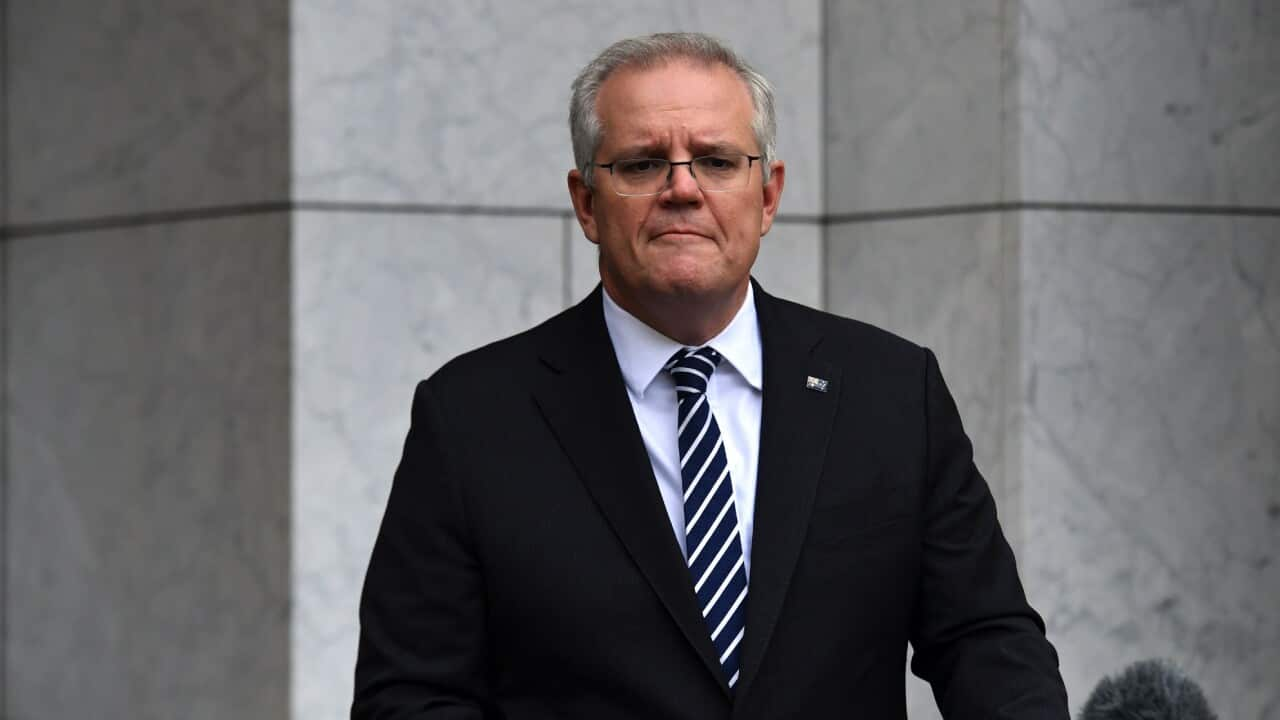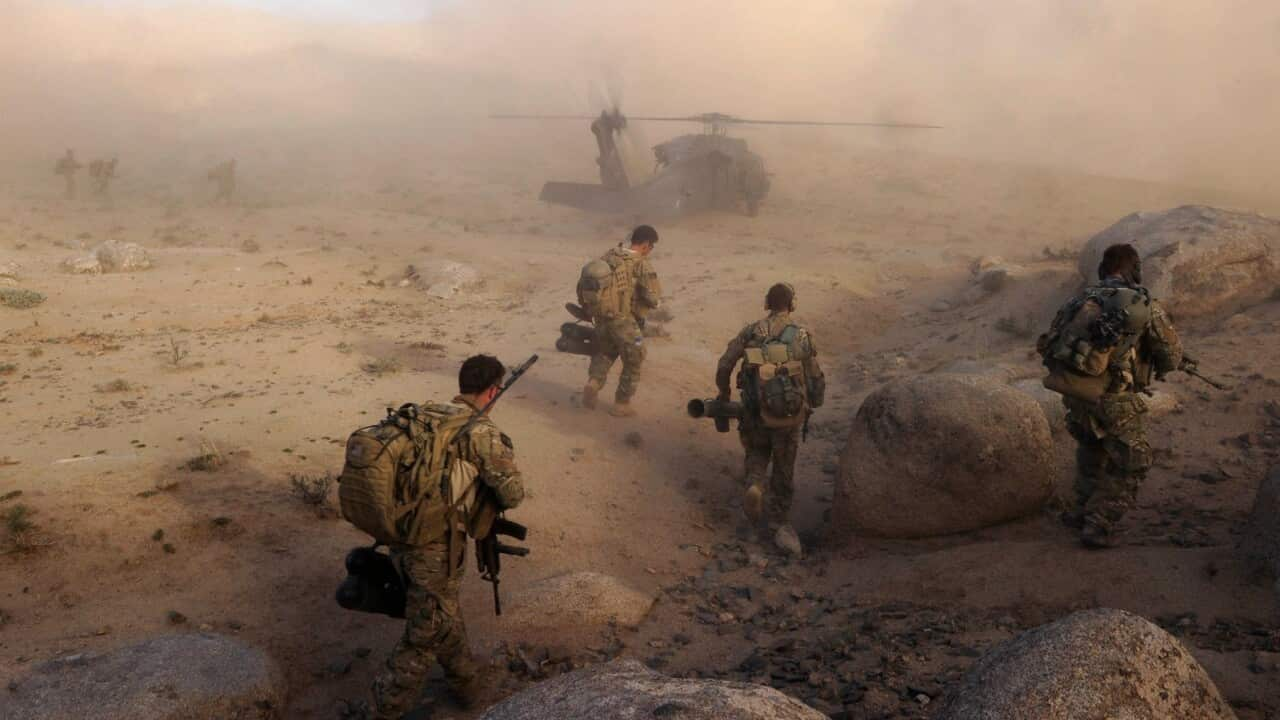This article contains references to suicide.
Taliban insurgents entered the Afghanistan capital Kabul on Sunday, an interior ministry official said, as the United States evacuated diplomats from its embassy by helicopter.
The senior official told Reuters the Taliban were coming in "from all sides" but gave no further details.
A Taliban official told Reuters the group did not want any casualties as it took charge but had not declared a ceasefire.
A tweet from the Afghan Presidential palace account said firing had been heard at a number of points around Kabul but that security forces, in coordination with international partners, had control of the city.
There was no immediate word on the situation from President Ashraf Ghani, who said on Saturday he was in urgent consultations with local leaders and international partners on the situation.
With the country's second and third-largest cities having fallen into Taliban hands, Kabul has effectively become the besieged, last stand for government forces who have offered little or no resistance elsewhere.
The United States started evacuating its diplomats and was sending more troops to help secure Kabul airport and the embassy after the Taliban's lightning advances brought the Islamist group to the door of the capital in a matter of days.
Heaving fighting was also reported around Mazar-i-Sharif, an isolated holdout in the north where warlord and former vice president Abdul Rashid Dostum had gathered his virulently anti-Taliban militia.
The only other cities of any significance not to be taken yet were Jalalabad, Gardez and Khost - Pashtun-dominated and unlikely to offer much resistance now.
President Joe Biden on Saturday doubled down on his decision to withdraw US forces from Afghanistan despite the Taliban's rapid advances, but pledged to send more troops to evacuate civilians and warned the insurgents not to threaten that mission.
After consultations with his national security team, Mr Biden said a total of "approximately 5,000" US soldiers - up from 3,000 - will now help organise evacuations and the end of the US mission after 20 years on the ground.
He warned the Taliban that any action "that puts US personnel or our mission at risk there, will be met with a swift and strong US military response".
Mr Ghani pledged on Saturday not to let the "imposed war on people cause more deaths", and said consultations were taking place to try to help end the war, without offering details.
Earlier, US Central Command said more American military personnel had arrived in Kabul to ensure the safe evacuation of American embassy employees and Afghan civilians who worked for US forces.
The Pentagon estimates it will need to evacuate about 30,000 people before it completes its withdrawal from Afghanistan by 31 August, a deadline set by Mr Biden.
Mr Biden's decision to pull troops out of Afghanistan has come under increased scrutiny given the implosion of the country's armed forces, but he said he had no other choice - and laid some of the blame at the feet of Donald Trump.
"When I came to office, I inherited a deal cut by my predecessor... that left the Taliban in the strongest position militarily since 2001 and imposed a May 1, 2021, deadline on US forces," Mr Biden said.
"I faced a choice - follow through on the deal, with a brief extension to get our forces and our allies' forces out safely, or ramp up our presence and send more American troops to fight once again in another country's civil conflict," he added.
"I was the fourth president to preside over an American troop presence in Afghanistan - two Republicans, two Democrats. I would not, and will not, pass this war onto a fifth," Mr Biden said.
A host of European countries - including Britain, Germany, Denmark and Spain - all announced the withdrawal of personnel from their respective embassies on Friday. On Saturday in Adelaide, hundreds of members of South Australia’s Afghan community rallied to condemn the Taliban and call for international action to halt the insurgents.
On Saturday in Adelaide, hundreds of members of South Australia’s Afghan community rallied to condemn the Taliban and call for international action to halt the insurgents.

Afghan woman Yalba Siddiqui (left) marched in Adelaide on Saturday Source: SBS News/Peta Doherty
“What is happening [in Afghanistan] is horrible at the moment,” marcher Yalba Siddiqui told SBS News.
Ms Siddiqui’s husband is still in Kabul and waiting for an Australian visa.
“Day and night I worry about his safety,” she said.
“I would like the Australian government to do something and hear our voice.”
'Crying day and night'
For Kabul residents and the tens of thousands who have sought refuge there in recent weeks, the overwhelming mood was one of confusion and fear.
Muzhda, 35, a single woman who arrived in the capital with her two sisters after fleeing nearby Parwan, said she was terrified for the future.
"I am crying day and night," she told the AFP news agency.
"I have turned down marriage proposals in the past ... If the Taliban come and force me to marry, I will commit suicide."
UN Secretary-General Antonio Guterres said he was "deeply disturbed" by accounts of poor treatment of women in areas seized by the Taliban, who imposed an ultra-austere brand of Islam on Afghanistan during their 1996-2001 rule.
"It is particularly horrifying and heartbreaking to see reports of the hard-won rights of Afghan girls and women being ripped away," Mr Guterres said.
The scale and speed of the Taliban advance have shocked Afghans and the US-led alliance that poured billions into the country after toppling the Taliban in the wake of the September 11 attacks nearly 20 years ago.
Days before a final US withdrawal ordered by Mr Biden, individual Afghan soldiers, units and even whole divisions have surrendered - handing the insurgents even more vehicles and military hardware to fuel their lightning advance.
'No imminent threat'
Despite the frantic evacuation efforts, the Biden administration continues to insist that a complete Taliban takeover is not inevitable.
"Kabul is not right now in an imminent threat environment," Pentagon spokesman John Kirby said Friday, while acknowledging that Taliban fighters were "trying to isolate" the city.
The Taliban offensive has accelerated in recent days, with the capture of Herat in the north and, just hours later, the seizure of Kandahar - the group's spiritual heartland in the south. Kandahar resident Abdul Nafi told AFP the city was calm after government forces abandoned it for the sanctuary of military facilities outside, where they were negotiating terms of surrender.
Kandahar resident Abdul Nafi told AFP the city was calm after government forces abandoned it for the sanctuary of military facilities outside, where they were negotiating terms of surrender.

The Taliban on Friday took control of Kandahar, Afghanistan’s second-biggest city. Source: AAP Image/EPA/AKHTER GULFAM
"I came out this morning, I saw Taliban white flags in most squares of the city," he said.
Pro-Taliban social media accounts have boasted of the vast spoils of war captured by the insurgents - posting photos of armoured vehicles, heavy weapons, and even a drone seized from abandoned military bases.
With Peta Doherty.
Readers seeking crisis support can contact Lifeline on 13 11 14, the Suicide Call Back Service on 1300 659 467 and Kids Helpline on 1800 55 1800 (for young people aged up to 25). More information and support with mental health is available at and on 1300 22 4636.
supports people from culturally and linguistically diverse backgrounds.












